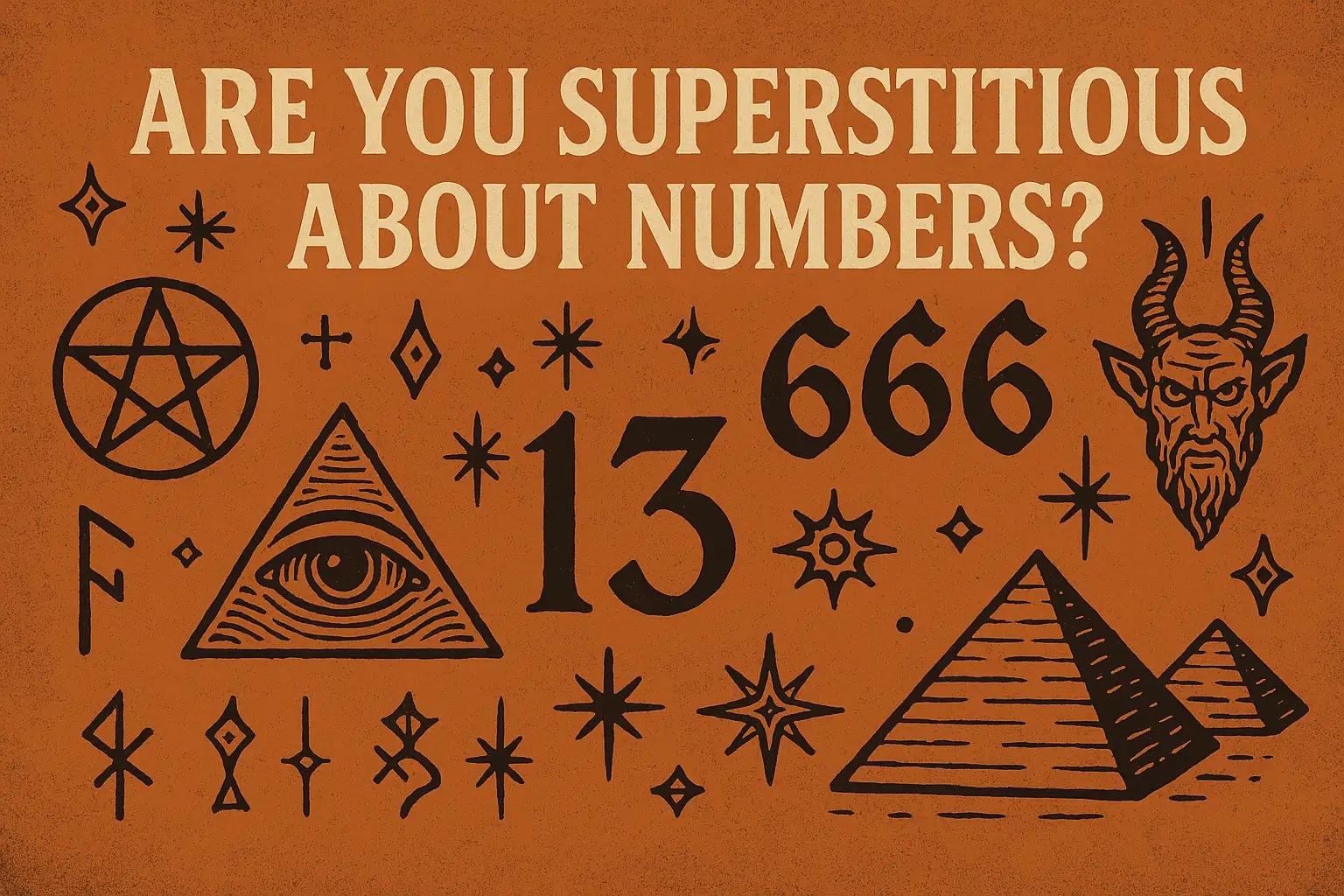Are you superstitious about numbers?
When you’re presented with a set of numbers or you have to choose one, are there certain numbers you avoid?
For me, I tend to do the opposite. I often lean toward the number that makes me feel a little uneasy — the one with some negative association. If 13 is considered unlucky, I’ll pick 13. I do not want to be defiant or anything, but I think those small, irrational biases can add up over time. When we repeatedly avoid things based on superstition — even harmless things like a number — we start to give that fear a little too much power.
Over time, these associations can shape our decisions in subtle ways. And if you keep reinforcing a negative feeling toward something that isn’t actually dangerous or harmful, it can become a kind of quiet weakness -a filter that limits your choices, your thinking, even your openness to new possibilities.
Different cultures have different ideas about which numbers are lucky or unlucky — and the differences are fascinating. It’s amazing how much emotional weight we give to something as neutral and abstract as a number, and how wildly that weight can vary depending on where you live or what stories you’ve heard.
Let’s take a little tour around the world to see what numbers mean in different cultures.
Asia: Death, Prosperity, and Infinite Fortune
In East Asia, the number 4 is often avoided because it sounds almost identical to the word for “death” in Mandarin, Cantonese, Japanese, and Korean. Buildings in China, Japan, and Korea sometimes skip the 4th floor entirely, labeling it as “5” instead.
Meanwhile, the number 8 is a superstar in Chinese culture. It sounds like “wealth” or “prosperity,” and people pay small fortunes for license plates, phone numbers, or addresses with lots of 8s. The 2008 Beijing Olympics even officially started on 8/8/08 at 8:08 PM — by design.
Japan has its own favorites too: 7 is considered very lucky, symbolizing happiness and togetherness — reflected in the Festival of the Seven Lucky Gods.
Africa: Sacred Numbers, Balance, and Spiritual Power
Across Africa, numbers often carry spiritual meaning — woven deeply into daily life, rituals, and beliefs.
In West Africa, particularly among the Yoruba people of Nigeria, the number 3 is powerful, symbolizing balance and completeness. Many ceremonies, blessings, and offerings come in threes.
The number 7 shows up across African traditions as a symbol of divine protection and the spiritual journey. In some East African cultures, seven is associated with ancestors guiding the living.
In North Africa, especially among Berber and Arab communities, the number 5 — symbolized by the “Hand of Fatima” or “Khamsa” — is revered for warding off evil. You’ll see the five-fingered hand amulet everywhere, believed to protect against bad luck and jealousy.
Meanwhile, 9 is sometimes treated with suspicion, especially in Islamic-influenced cultures where the transition from 9 to 10 carries symbolic weight about endings and new beginnings.
Numbers in Africa are rarely just numbers — they are living, breathing symbols of identity, spirituality, and community.
Europe: Lucky Sevens and Fearsome Thirteens
Europe’s number superstitions run deep, shaped by centuries of history and religion.
13 is the classic “bad luck” number across much of Europe, mainly because of Christian tradition — Judas was the 13th guest at the Last Supper. Hotels, hospitals, and even airlines often avoid the number entirely.
But it’s not universal: in Italy, 17 is seen as even more unlucky. In Roman numerals (XVII), the letters can be rearranged to spell “VIXI” — meaning “I have lived” — a phrase associated with death.
Meanwhile, 7 has been considered lucky since ancient times, linked to sacred ideas: the seven days of creation, the seven virtues, the seven wonders of the world.
In Ireland and Scotland, 3 is magical, tied to Celtic symbolism: past, present, and future; land, sea, and sky; body, mind, and spirit.
The Americas: Blending Old Beliefs and New Superstitions
In North America, 13 is the notorious troublemaker. Skyscrapers sometimes skip the 13th floor, airplanes avoid row 13, and Friday the 13th has its own horror movie franchise.
But in Latin America, it’s not Friday — it’s Tuesday the 13th that’s considered bad luck. A popular Spanish phrase warns, “Martes, ni te cases ni te embarques” (“On Tuesday, don’t marry or start a journey”).
Among Native American tribes, numbers like 4 are sacred. The Navajo, Sioux, and Hopi, among others, honor the four cardinal directions (north, south, east, west) and the four sacred elements — seeing 4 not as unlucky, but as deeply connected to life.
In Brazil, 8 is tied to infinity and strength, and many people consider it a lucky number for business ventures.
Oceania: Respecting Nature’s Numbers
In Australia and across the Pacific Islands, traditional cultures have long respected numbers connected to the natural world.
Among some Aboriginal Australian groups, 5 and 7 hold significance — linked to cycles of the moon, seasons, and life stages. Storytelling often weaves in numbers to map geography, ancestry, and moral lessons.
Modern Australian culture, influenced by British traditions, still teases 13 as an unlucky number — but mostly with a wink and a joke. Cricket players talk about “nervous nineties” (being close to 100 runs) rather than fearing 13.
In Maori traditions in New Zealand, numbers like 2 and 5 carry ancestral meanings, related to family lines and tribal history.
Stepping Beyond the Superstitions
But here’s something I try to remind myself: the world is full of opportunity, and when we let go of small, inherited biases — like being wary of a certain number — the world opens up even more. When we stop filtering our choices through fear or superstition, we might just find better outcomes, more freedom, or at least a bit more peace of mind.
And it’s not just numbers. We carry all sorts of quiet superstitions — about colors, dates, names, places, even foods. Some are cultural, some personal. We avoid certain days to travel. We hesitate to say certain things out loud. We knock on wood. We believe a gut feeling might be a sign from the universe.
I’m not saying it’s all bad. There’s something kind of charming about superstition. It makes us human. But if you’re like me and you enjoy growing, evolving, and challenging yourself, then sometimes it’s worth pausing and asking: Why do I believe this? What if I did the opposite?
Sometimes choosing the “unlucky” number is just a small act of personal rebellion. Other times, it’s a reminder that the limits we accept are often the ones we unconsciously place on ourselves.
So next time you’re faced with a number you don’t like — or anything else that gives you that superstitious pause — consider going straight toward it.
You might just take back a little power you didn’t even realize you gave away



